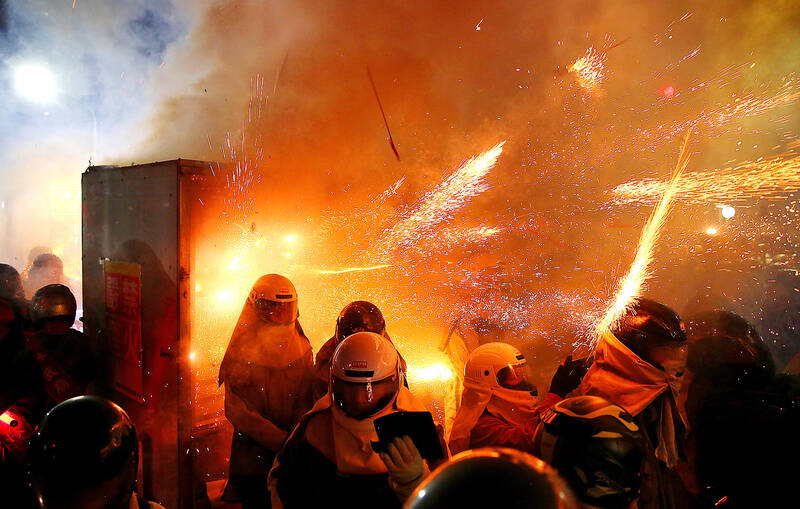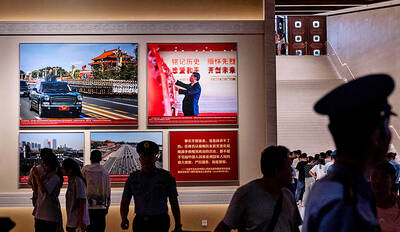The annual two-day Yanshui Beehive Fireworks Festival, a tradition with more than 100 years of history, began yesterday in Tainan’s Yanshuei District (鹽水), featuring more than 2 million "beehive firecrackers."
The festival, traditionally held on the 14th and 15th days of the first month in the lunar calendar to celebrate the Lantern Festival, started at Yanshui Wu Temple, the main organizer.
Tainan Mayor Huang Wei-che (黃偉哲) lit the first string of firecrackers to mark the start of the event before boarding a parade float to tour Yanshuei’s main streets, throwing candy to bystanders as a blessing for the public.

Photo: Lee Hui-chou, Taipei Times
According to the temple, the festival’s procession is to be divided into five routes covering different areas of Yanshuei, with about 200 firecracker sets awaiting participants along the way.
The highlight of the event is to take place this evening at Tainan Municipal Yanshuei Junior High School, where about 2 million firecrackers are to be simultaneously launched from three large LED-lit firecracker towers.
As the temple palanquin passes by spectators may be struck by the firecrackers, which are believed to "end ill fortune, resolve difficulties and bring good luck for the coming year," the Tainan Tourism and Travel Bureau said.
Those intending to attend the festival should wear protective and nonflammable clothing that completely covers the body and face to avoid potential injuries caused by fireworks, the city government said.

Three batches of banana sauce imported from the Philippines were intercepted at the border after they were found to contain the banned industrial dye Orange G, the Food and Drug Administration (FDA) said yesterday. From today through Sept. 2 next year, all seasoning sauces from the Philippines are to be subject to the FDA’s strictest border inspection, meaning 100 percent testing for illegal dyes before entry is allowed, it said in a statement. Orange G is an industrial coloring agent that is not permitted for food use in Taiwan or internationally, said Cheng Wei-chih (鄭維智), head of the FDA’s Northern Center for

The Chinese military has built landing bridge ships designed to expand its amphibious options for a potential assault on Taiwan, but their combat effectiveness is limited due to their high vulnerability, a defense expert said in an analysis published on Monday. Shen Ming-shih (沈明室), a research fellow at the Institute for National Defense and Security Research, said that the deployment of such vessels as part of the Chinese People’s Liberation Army (PLA) Navy’s East Sea Fleet signals a strong focus on Taiwan. However, the ships are highly vulnerable to precision strikes, which means they could be destroyed before they achieve their intended

About 4.2 million tourist arrivals were recorded in the first half of this year, a 10 percent increase from the same period last year, the Tourism Administration said yesterday. The growth continues to be consistent, with the fourth quarter of this year expected to be the peak in Taiwan, the agency said, adding that it plans to promote Taiwan overseas via partnerships and major events. From January to June, 9.14 million international departures were recorded from Taiwan, an 11 percent increase from the same period last year, with 3.3 million headed for Japan, 1.52 million for China and 832,962 to South Korea,

REWRITING HISTORY: China has been advocating a ‘correct’ interpretation of the victory over Japan that brings the CCP’s contributions to the forefront, an expert said An elderly Chinese war veteran’s shin still bears the mark of a bullet wound he sustained when fighting the Japanese as a teenager, a year before the end of World War II. Eighty years on, Li Jinshui’s scar remains as testimony to the bravery of Chinese troops in a conflict that killed millions of their people. However, the story behind China’s overthrow of the brutal Japanese occupation is deeply contested. Historians broadly agree that credit for victory lies primarily with the Chinese Nationalist Party (KMT)-led Republic of China (ROC) Army. Its leader, Chiang Kai-shek (蔣介石), fled to Taiwan in 1949 after losing a